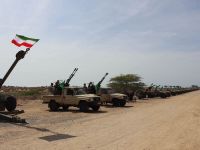British forces conducted their first drone attacks on ISIS militants in Iraq over the weekend, the Ministry of Defence has said.
A series of coalition missions were conducted near Bayji, north of Baghdad, where extremists were planting improvised explosive devices (IEDs).
The MoD said an unmanned aircraft known as a Royal Air Force Reaper 'successfully attacked the terrorists using a Hellfire missile'.
It added: 'UK Reaper continued to provide intelligence, surveillance and reconnaissance assistance to coalition aircraft which enabled them to conduct further strikes.'
Dr Natasha Underhill, an expert on terrorism in the Middle East at Nottingham Trent University, said: 'It was only a matter of time before the UK forces would play a direct role in the context of drone airstrikes.
'The shift from reconnaissance to direct military targeting and strikes means that there is now no turning back. It also highlights the ongoing significance of the threat from ISIS.
'The increasing involvement by the UK in military action such as the drone strikes shows that the threat is nowhere near an end. It may now only be a matter of time before we see the re-introduction of troops into Iraq.'
On Sunday morning, a pair of RAF Tornado fighter bombers also destroyed a shipping container near Al Anbar, west of Baghdad.
The MoD said the container was 'used by the terrorists to store equipment to support extortion and control of the local population'.
Fitted with laser-guided bombs and Hellfire missiles, the RAF's Reaper Drones first saw action in Afghanistan.
Their main role is to gather intelligence and carry out surveillance for forces on the ground, but they can also be armed with deadly weapons.
The drone has a maximum range of 5,300 miles and can fly for up to 32 hours at 287mph.
The MoD has been keen to step away from the term 'drone' when talking about unmanned air systems, because it elicits ideas of unaccountable computerised technology, preferring the term 'remotely piloted air system'.
The aircraft have been flying missions over Syria to gather intelligence on the terrorist threat from ISIS.
Defence Secretary Michael Fallon said: 'As well as their operations over Iraq, both Reapers and Rivet Joint surveillance aircraft will be authorised to fly surveillance missions over Syria to gather intelligence as part of our efforts to protect our national security from the terrorist threat emanating from there.'
'Reapers are not authorised to use weapons in Syria; that would require further permission.'








